No, not in that Incredibles way. The House Next Door, an excellent film/television blog I routinely check after every new episode of The Wire, Battlestar Galactica, and Doctor Who, has sparked a fun conversation about choice movie monologues (somewhat akin to the list here.)
Month: October 2006
No Dubya Left Behind.
“But if the list is for real, it’s evidence of presidential dereliction of duty, and perhaps an outright threat to national security. Two books a week is an uphill battle for a graduate student whose responsibilities don’t even include showering. For a president, who lives at work, reading and comprehending two serious books a month takes a Herculean effort.” (Hey, I shower!…um, most days.) Slate‘s Bruce Reed discusses Dubya’s newfound love for books, suggesting that his recent reading contest with Karl Rove is part of the reason why things have gone so astray of late for this president. Well, call me old-fashioned, but — My Pet Goat notwithstanding — I’d usually rather see Dubya with his nose in a good book than see him make any more lousy world-threatening decisions. Besides. Dubya dug himself in this hole long before 2006…some healthy book learnin’ might’ve done him right earlier in his tenure. Hey, at the very least, he might’ve locked down that whole pesky Shia-Sunni thing.
Absolutely Sweet Marie.
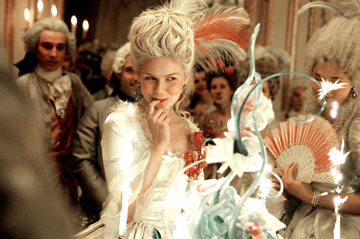 In my generally positive review of Lost in Translation a few years back, I complained that “this story could only have been written by deeply privileged people.” Well, Sofia Coppola’s newest film, Marie Antoinette, makes Lost in Translation seem like a working-class anthem. To be honest, I find my thoughts dwelling on Marie Antoinette in the few days since I saw it, and I’m liking it better in retrospect than I did while actually watching the movie. Still, Coppola’s film seems narrowly conceived to a fault. It conveys both the life-on-Mars quality of Versailles and the innocent decadence of privileged youth decently well (even if Antoinette was almost 35 by the time of the Revolution), but, in my humble opinion, the movie needed a lot more politics and a lot less in the way of shoes and pastries. As it is, despite all the wallowing in material delights, Marie Antoinette displays little in the way of a narrative arc, and, to my mind, it felt both unfinished and unsatisfying.
In my generally positive review of Lost in Translation a few years back, I complained that “this story could only have been written by deeply privileged people.” Well, Sofia Coppola’s newest film, Marie Antoinette, makes Lost in Translation seem like a working-class anthem. To be honest, I find my thoughts dwelling on Marie Antoinette in the few days since I saw it, and I’m liking it better in retrospect than I did while actually watching the movie. Still, Coppola’s film seems narrowly conceived to a fault. It conveys both the life-on-Mars quality of Versailles and the innocent decadence of privileged youth decently well (even if Antoinette was almost 35 by the time of the Revolution), but, in my humble opinion, the movie needed a lot more politics and a lot less in the way of shoes and pastries. As it is, despite all the wallowing in material delights, Marie Antoinette displays little in the way of a narrative arc, and, to my mind, it felt both unfinished and unsatisfying.
As the film begins, mirthful 14-year-old free spirit Marie Antoinette (Kirsten Dunst) has just been married off by her mother, the Empress Maria Theresa of Austria (Marianne Faithful), to the pudgy, young, and introverted dauphin of France, Louis XIV (Jason Schwartzman). And so we spend the first forty minutes of the film following young Marie’s introduction to the cauldron of social intrigue that is Versailles, where she is shuffled to and fro by her grim handler, the Comtesse de Noailles (Judy Davis, looking like the Borg Queen), and becomes the target of a whispering campaign due to her still-unconsummated marriage (a plot point that doesn’t work at all, given how far Dunst and Schwartzman are from 14 and 15 respectively.) At any rate, eventually Marie makes a few friends — most notably the Duchesse de Polignac (Rose Byrne) — and a few enemies, such as Madame Du Barry (Asia Argento), courtesan to Louis XV (Rip Torn). And she picks up several bad habits, including but not limited to gambling, shopping, all-night festivities, and the Count Axel von Fersen (Jamie Dornan), most of which are scored — usually pretty effectively — to post-punk or new wave tracks by Gang of Four (“Natural’s Not in It”), New Order (“Ceremony”), The Cure (“Plainsong”), and others.
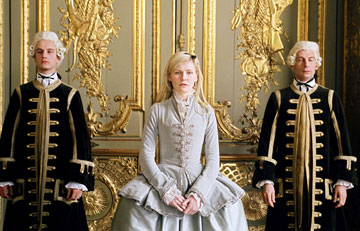 Of course, as we all know, the party can’t last forever, and Marie Antoinette’s reveries have a particularly nasty end. But the Revolution only takes up about fifteen minutes of the film here, and in fact is basically sidestepped (which feels a bit like making a movie about the Titanic and skipping the iceberg, but ah well.) Obviously, it was Coppola’s artistic decision not to wallow in the horrors that beset Antoinette’s final years, but that same lack of focus about anything other than good times at Versailles mars the rest of the film. Contrary to the figure portrayed here, Antoinette was engaged in the political issues facing her kingdom, particularly late in her reign. But, here’s she seems just a poor-little-rich-party-girl until the merde hits the fan in a big way in 1789. (There are a few scenes involving the French decision to aid the American Revolutionaries, I guess, but they seem unconnected to everything else going on and are in effect shoehorned in.)
Of course, as we all know, the party can’t last forever, and Marie Antoinette’s reveries have a particularly nasty end. But the Revolution only takes up about fifteen minutes of the film here, and in fact is basically sidestepped (which feels a bit like making a movie about the Titanic and skipping the iceberg, but ah well.) Obviously, it was Coppola’s artistic decision not to wallow in the horrors that beset Antoinette’s final years, but that same lack of focus about anything other than good times at Versailles mars the rest of the film. Contrary to the figure portrayed here, Antoinette was engaged in the political issues facing her kingdom, particularly late in her reign. But, here’s she seems just a poor-little-rich-party-girl until the merde hits the fan in a big way in 1789. (There are a few scenes involving the French decision to aid the American Revolutionaries, I guess, but they seem unconnected to everything else going on and are in effect shoehorned in.)
Which isn’t to say Marie Antoinette isn’t completely without merit. At times, it — much like The Virgin Suicides, Coppola’s first film — fashions out of the Antoinette story a haunting mediation on the doomed and fleeting transience of youth. (The New Order helps.) And there are several good performances in and around the margins, including Steve Coogan (always threatening to Tristam Shandy at any moment) as the Comte de Mercy-Argenteau and Danny Huston as Emperor Joseph II of Austria (although I do wish he’d thrown in a “hm-hm” to pay homage to Jeffrey Jones.) But, ultimately, this film is just too thin a take on Antoinette’s story to sustain interest over two hours. There’s barely any there there. Even subplots that should be in Coppola’s wheelhouse, given her choice of themes here, seem underdeveloped (most notably Antoinette’s rivalry with Du Barry — It happens, but doesn’t really amount to anything.) And, while the last few shots are undeniably haunting, they can’t justify the long and circuitous route it took to get there. I don’t have a problem with a sympathetic take on Marie Antoinette, per se, but it would’ve been nice to have seen a more fully-developed one.
Take your seats.
“‘The Democrats are going to gain somewhere between four and seven seats,’ said Stuart Rothenberg, author of an independent newsletter that tracks campaigns nationwide.” The WaPo surveys recent trends in the battle for the Senate, concluding that a Dem takeover is still eminently possible, if not yet probable. “Of the battlegrounds of Tennessee, Virginia and Missouri, [Rothenberg] said, ‘They need two of the three, and they have a pretty good chance’ of winning them.”
The Stationery Agent.
By way of my sister and much like the M&Ms horror film game blogged a few weeks ago, test your skill at deciphering Viking Stationery Movies. So far, I’ve got 18-20…missing the markers in the road and the paperclip fellow getting run over.
Magic Most Sinister.
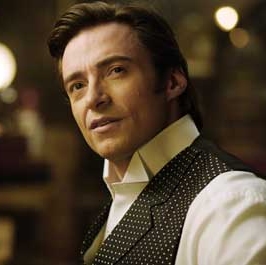 Are you watching closely? I’m having a harder time than usual thinking of what to say about Christopher Nolan’s The Prestige, not only because I think it’s a film best seen cold, with as little information going in as possible, but also because, having read the book by Christopher Priest, my experience with the film was very different from that of most folks. As Michael Caine’s ingenieur Cutter notes at one point, successful magic is all about confusion and misdirection — if you know how it’s done, even a complex and fantastic magic trick can seem blatantly obvious from the get-go. So my time with The Prestige was roughly akin to seeing The Sixth Sense and knowing Bruce Willis is a ghost from the first reel. That being said, while I can’t vouch for how well Nolan conceals his own prestiges from the audience here, I found the movie a dark, clever, and elegant contraption, one that suggests razor-sharp clockwork gears and threatening pulses of electrical current, all impressively encased in burnished Victorian-era mahogany. If you’re a fan of Nolan’s previous work, or of sinister mind-benders in general, The Prestige is a must-see film. Either way, it’s among the top offerings of 2006 thus far.
Are you watching closely? I’m having a harder time than usual thinking of what to say about Christopher Nolan’s The Prestige, not only because I think it’s a film best seen cold, with as little information going in as possible, but also because, having read the book by Christopher Priest, my experience with the film was very different from that of most folks. As Michael Caine’s ingenieur Cutter notes at one point, successful magic is all about confusion and misdirection — if you know how it’s done, even a complex and fantastic magic trick can seem blatantly obvious from the get-go. So my time with The Prestige was roughly akin to seeing The Sixth Sense and knowing Bruce Willis is a ghost from the first reel. That being said, while I can’t vouch for how well Nolan conceals his own prestiges from the audience here, I found the movie a dark, clever, and elegant contraption, one that suggests razor-sharp clockwork gears and threatening pulses of electrical current, all impressively encased in burnished Victorian-era mahogany. If you’re a fan of Nolan’s previous work, or of sinister mind-benders in general, The Prestige is a must-see film. Either way, it’s among the top offerings of 2006 thus far.
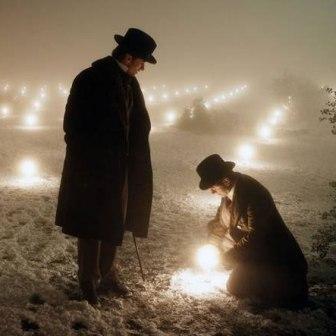 So, what’s the pledge? Slumming aristocrat Robert Angier (Hugh Jackman) and working-class upstart Alfred Borden (Christian Bale, particularly good) both serve as magician’s assistants to a by-the-numbers prestidigitator (Ricky Jay) — they’re audience plants — and both harbor aspirations of taking their own act on the road. But after an on-stage tragedy involving Angier’s escapist wife (Piper Perabo), a wedge is driven between these two would-be men of magick, fomenting a lifelong rivalry that turns increasingly brutal and obsessive. This becomes particularly so after Borden, the more talented illusionist, comes up with a nifty trick — The Transported Man — that Angier, the more impressive showman, can’t seem to match, even with the aid of his longtime ingenieur, Cutter (Caine). Eventually, Angier is compelled to travel to faraway Colorado Springs to pay visit to a wizard of a different order, Nikola Tesla (David Bowie), and perhaps enlist him (and his Igor-by-way-of-Brooklyn assistant, (Andy Serkis)) in unraveling Borden’s secret. (As apparently required by law this year, Scarlett Johansson also factors in the tale as Olivia, a lovely magician’s assistant bandied back and forth by the two rivals, but it’s a smaller part than you might expect, and newcomer Rebecca Hall makes more of an impression as Borden’s long-suffering wife, Sarah.)
So, what’s the pledge? Slumming aristocrat Robert Angier (Hugh Jackman) and working-class upstart Alfred Borden (Christian Bale, particularly good) both serve as magician’s assistants to a by-the-numbers prestidigitator (Ricky Jay) — they’re audience plants — and both harbor aspirations of taking their own act on the road. But after an on-stage tragedy involving Angier’s escapist wife (Piper Perabo), a wedge is driven between these two would-be men of magick, fomenting a lifelong rivalry that turns increasingly brutal and obsessive. This becomes particularly so after Borden, the more talented illusionist, comes up with a nifty trick — The Transported Man — that Angier, the more impressive showman, can’t seem to match, even with the aid of his longtime ingenieur, Cutter (Caine). Eventually, Angier is compelled to travel to faraway Colorado Springs to pay visit to a wizard of a different order, Nikola Tesla (David Bowie), and perhaps enlist him (and his Igor-by-way-of-Brooklyn assistant, (Andy Serkis)) in unraveling Borden’s secret. (As apparently required by law this year, Scarlett Johansson also factors in the tale as Olivia, a lovely magician’s assistant bandied back and forth by the two rivals, but it’s a smaller part than you might expect, and newcomer Rebecca Hall makes more of an impression as Borden’s long-suffering wife, Sarah.)
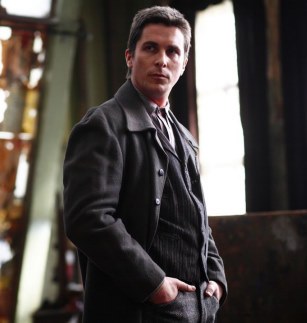 In keeping with Nolan’s usual m.o., The Prestige is not told linearly, but in narrative fragments spurred by memory, sadness, or anger. In fact, the film begins near the end, with Borden first witnessing and then on trial for the apparent murder of Angier. (Well, that is, after a striking title shot of top hats piled up bizarrely in a forest bed, a shot which makes more sense as the story progresses — I’ll admit to being a sucker for films that start off thus.) And, while the film takes a few jags away from Priest’s book (including omitting both the framing device — good choice — and the very last sequence, which I thought was deliriously creepy and somewhat missed here), it nevertheless keeps the basic story arcs of the novel intact. (In other words, and while remaining as oblique as possible, mystery purists may feel somewhat cheated by the Tesla turn the story takes ninety minutes in, but it’s central to the source material, and had to be there.) Also like the book, Nolan’s final hole card is a deeply disturbing one that’ll linger in the senses well after this trick is complete. In sum, along with Memento and Batman Begins, this jagged tale of illusion and obsession should only add to Chris Nolan’s burgeoning prestige: Bring on The Dark Knight.
In keeping with Nolan’s usual m.o., The Prestige is not told linearly, but in narrative fragments spurred by memory, sadness, or anger. In fact, the film begins near the end, with Borden first witnessing and then on trial for the apparent murder of Angier. (Well, that is, after a striking title shot of top hats piled up bizarrely in a forest bed, a shot which makes more sense as the story progresses — I’ll admit to being a sucker for films that start off thus.) And, while the film takes a few jags away from Priest’s book (including omitting both the framing device — good choice — and the very last sequence, which I thought was deliriously creepy and somewhat missed here), it nevertheless keeps the basic story arcs of the novel intact. (In other words, and while remaining as oblique as possible, mystery purists may feel somewhat cheated by the Tesla turn the story takes ninety minutes in, but it’s central to the source material, and had to be there.) Also like the book, Nolan’s final hole card is a deeply disturbing one that’ll linger in the senses well after this trick is complete. In sum, along with Memento and Batman Begins, this jagged tale of illusion and obsession should only add to Chris Nolan’s burgeoning prestige: Bring on The Dark Knight.
Bullock v. McClane.
So, as it turns out, Wright was wrong: Instead, Deadwood‘s Tim Olyphant is cast as the villain in Die Hard 4 — still called (sigh) Live Free or Die Hard — along with Mary Elizabeth Winstead of Sky High as Bruce Willis’ daughter, all grown up.
Nguyen or Go Home.
Another GOP scandal? Oh, why not. This time, the culprit is California Republican longshot Tam Nguyen, who apparently was the mastermind behind 14,000 letters sent to scare immigrants from the polls. “Written in Spanish, the letters advise recently registered voters that it is a crime for those in the country illegally to vote in a federal election, which is true. They also say, falsely, that immigrants may not vote and could be jailed or deported for doing so, that the federal government has a new computer system to verify voter names, and that anti-immigration organizations can access the records.” Nguyen has said he’ll stay in the race against Democratic congresswoman Loretta Sanchez, even though his own party is disavowing him.
Aaaigh!
For the increasingly factious and terrified GOP, it’s second verse, same as the first: Terror, terror, terror, 9/11, 9/11, 9/11…
Ethan elocutes.
“Not to be crass, but Ethan Stiefel, the American Ballet Theatre principal who starred in the film Center Stage, has had a shitty year.” Time Out: New York publishes an extended interview with my sister’s boyfriend, Ethan. Which reminds me: ABT’s City Center season is now in full swing, so get your tickets while you can. (I’ll be going several times over the next few weeks.)
